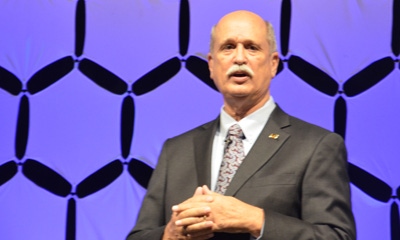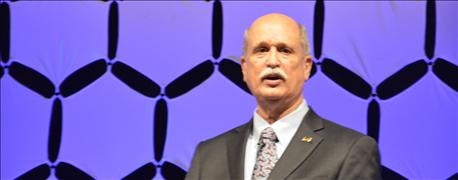
What does Don Villwock think about when he looks back on his bid to become American Farm Bureau Federation president? Did he learn lessons from the experience? Did it leave him downcast and bitter?
Villwock, former president of Indiana Farm Bureau, sat down with Indiana Prairie Farmer recently to answer these questions and more.
IPF: What do you feel you learned about U.S. agriculture from the experience of running for AFBF president?
Villwock: When you visit 22 states to talk to Farm Bureau delegates and properly prepare for each visit, you are going to learn things. Agriculture is quite different across the U.S.

MOVE FORWARD: Don Villwock didn’t stay retired from public life long. Now the former Indiana Farm Bureau president is assisting Purdue University Dean of Agriculture Jay Akridge with special projects.
First, I learned cotton is still a very important crop in the South and Southwest. Prices have been depressed, but it is still a big crop. There are two end products, fiber and oil, with the oil coming from the seed. One issue while I was campaigning was a push by Southern growers for cottonseed oil to be considered a commodity by USDA, and be eligible for commodity loans and government payments. Some 60% of AFBF delegates are from Southern states. The delegates made this a priority. Sometime after the convention in 2016, they actually got the changes they were seeking.
Before I went to Louisiana to campaign, I learned what I could about sugar. That is a unique crop, and one that is very important there. It figured into ag policy in that part of the country.
IPF: We hear a lot about people wanting locally grown food today. Did that show up on your radar during your visits?
Villwock: Absolutely! The Northeast doesn’t have many Farm Bureau delegates, so some candidates don’t go there, but I decided that I should. They are quite into the farm-to-fork movement. You might find a farmer at a grocery store telling customers how he produces food. Locally grown food and niche marketing are big deals in that part of the U.S. There are a few pure commercial grain operations there. Growers have figured out [that] many people want to know more than just about the food. They want to know the science and technology behind what farmers are doing. It’s a different mindset there.
IPF: Are you bitter in any way about the way things turned out?
Villwock: No, I’m not bitter. I still support Farm Bureau 100%, and we’re planning on going to the National AFBF Convention in January. We have lots of good friends all over the country in Farm Bureau. We knew it was an uphill battle from the start because of demographics, but it looked like we had a shot. Things just didn’t go our way.
IPF: Are there politics inside Farm Bureau?
Villwock: Yes. The cottonseed issue that was so important to the South probably hurt me just because I am from a northern state. We’re not that far north of the Mason-Dixon Line, but to some people in the South, it still matters.
IPF: What did you learn about politics in general?
Villwock: I have a much deeper appreciation for state and national candidates. Running a campaign and traveling is difficult. I had more time than most political candidates do between visits to prepare, and I still found it taxing. If you’re going somewhere you haven’t been, you have to do preparation. I can’t imagine being in several states in the same day!
About the Author(s)
You May Also Like




